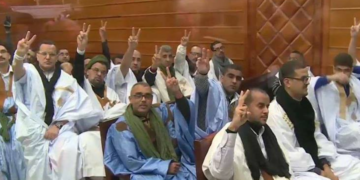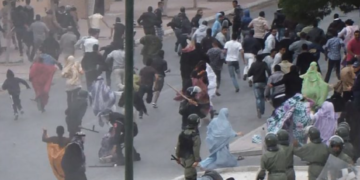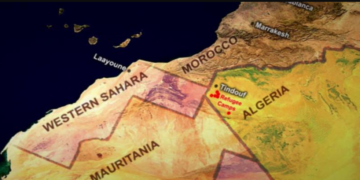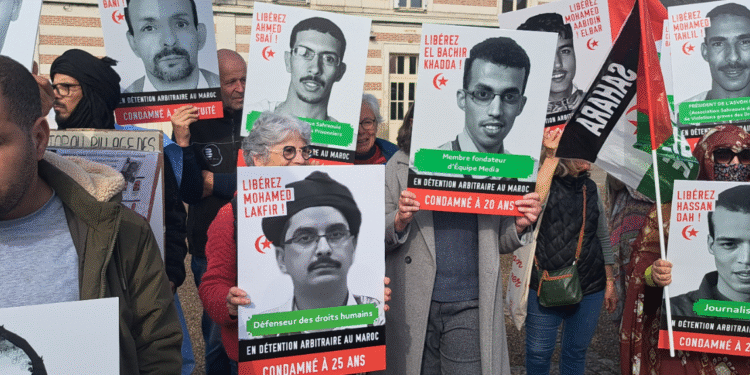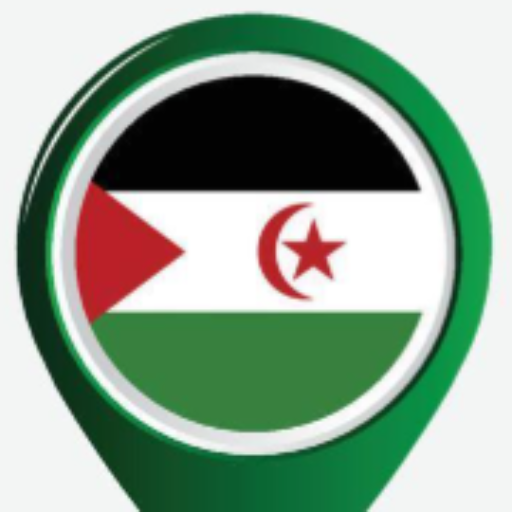In a scene that embodies human determination and the struggle for justice, French activist Claude Mangin-Asfari launched a symbolic initiative titled “The Freedom March” in late March 2025. Starting from Ivry, a suburb of Paris, she aims to reach the Kenitra prison in Morocco on foot—where her husband, Sahrawi political prisoner Naâma Asfari, along with many of his fellow detainees, has been imprisoned for over 15 years under harsh and inhumane conditions.
The March’s Message: Freedom for Sahrawi Political Prisoners
The “Freedom March” spans more than 3,000 kilometers, crossing France and Spain en route to Morocco. It carries urgent messages directed at the international community, including:
The immediate and unconditional release of Sahrawi political prisoners, particularly the Gdeim Izik group, whose detention was declared arbitrary and illegal by the United Nations Working Group on Arbitrary Detention in 2023.
A protest against the Moroccan authorities’ denial of Mangin’s right to visit her husband for several years, in blatant violation of international norms governing the rights of prisoners and their families.
A spotlight on the ongoing human rights abuses in Western Sahara, where Sahrawis continue to face systematic oppression, torture, fabricated charges, and media silence.
A Cry from the Heart of Europe to the Walls of Kenitra
Claude Mangin is not just the wife of a prisoner—she is a global conscience in motion, championing the right of oppressed peoples to freedom and dignity. The march has become a mobile human rights platform, where she meets citizens, activists, and politicians to raise awareness about the Sahrawi cause—at a time when the world chooses to turn a blind eye to the tragedy unfolding in Western Sahara.
Support Grows Despite Smear Campaigns
Despite attempts by the Moroccan regime and its media to undermine and demonize the march, the initiative has garnered significant support from human rights organizations, French elected officials, and international media outlets. French MPs have described their country’s stance on Western Sahara as “shameful and complicit”, denouncing France’s silence as a direct affront to international law.
From Paris to Kenitra: A March for Dignity
Each step Claude Mangin takes carries the weight of an entire people seeking justice. Her march is a peaceful civil resistance in the face of state repression. She knows that reaching Kenitra won’t change everything—but she believes that silence is no longer an option, and that to remain silent in the face of injustice is to be complicit in it.
A Call to the World
Through the “Freedom March,” a renewed appeal is launched to:
International human rights organizations to exert real pressure on Morocco to release all Sahrawi political prisoners.
European governments, especially France and Spain, to end their complicity with the Moroccan occupation at the expense of the values they claim to uphold.
Independent media to amplify coverage and break the silence surrounding Western Sahara.
The “Freedom March” is not just a grueling physical journey—it is a symbol of enduring resistance against injustice. It is a cry to a world that allowed justice to be caged, and turned its back on truth. It is a brave declaration that says: No matter how long the night of oppression lasts, the sun of freedom will rise.
And those who walk from Paris to Kenitra aren’t just looking for a path—they’re forging one.


